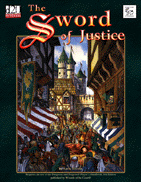
|
About OgreCave and its staff
|

|
by Joe G. Kushner
This module is something whose concept I don't see used enough: a low level adventure placed in the urban environment. The players are in Om Amarna, a city where spellcasting is not allowed in the streets, where spells can backfire due to a curse, and where a circle of rulers are elected by the landowners. Of course, not everything is perfect in said city. Some of the denizens of the city are a new race, the Arocha, who in many ways, remind me of the Krug from Dungeon Siege. For those who've missed the honor of playing Dungeon Siege, the Krug are a race that isn't quite on the level of humanity in terms of technology or magical ability, but seek to emulate them. In the past, they were a danger and were often used by nefarious forces to cause havok. Not quite the monsters they used to be perhaps, but disliked and feared nonetheless. One of these Arocha, Joshua Reader, approaches one of the elected Council members, Merin Dasa, and in the public eye, begins to have a debate about the virtue of only landowners having a vote and how the political system is more hereditary than anything else. The trouble starts as the debate is interrupted by the assassination of the Arocha, Joshua Reader. Those present at the assassination, including the Council member, the party, and another Arocha, Nadok Merchant, are all considered guilty and given two days to prove their innocence. They gain these two days through the use of an Advocate, a special investigator whose job is to help the characters prove their innocence. Once the party accepts these terms, they have to find the real murderer. Fortunately, there are numerous clues and encounters that the GM can use to help move the party along the road. One of the better things about this module is that there are several diversions that can happen to liven up the pace for players who have no interest in being hung for murder. For example, because this time of year in Om Armarna boasts the Horse Festival, things are crazier now than they normally are. This provides the GM the opportunity to throw in encounters with rogues, caravaners, escaped animals, and even get stuck in the middle of a spell duel. Many of these encounters are optional, of course. The GM really only needs for the players to stumble upon a few of the required encounters to solve the mystery. This involves investigating shards of pottery, discovering the properties of a dagger, and talking to lots of different people in different places of the city. NPCs are fleshed out enough to give the GM a good handle on using them in play. Travel time is taken into account by Monkeygod through the use of a map of the city which includes a worksheet to calculate the number of minutes taken. This useful tool makes the GM's timekeeping job much easier.
The Journey Goes Astray In addition to the adventure, the module includes details on the city. This includes a map of the different city wards, brief historic details, walking time between various wards, details on the curse upon the city that afflicts magic, and information on the denizens of the sewers. In a bold move, the designer put a powerful wraith into the sewers, and smart players will do as the module suggests: run. Stats and background on the Arocha are provided for GMs wishing to add these creatures to a regular campaign. These don't seem to mix with regular D20 stats as most racial traits are done in even, not odd numbers for racial modifiers. In addition, the Advocates are presented as a new Prestige Class that serve under the Cult of Justice, an organization that handles law throughout the city and country.
Most of the book's art didn't impress me, nor did the layout, which boasts lots of white
space and large margins. Those looking to see what some of the interior art looks like need to hit the old
browser up to this web page and scroll to the bottom: On one hand, this type of adventure is rare. On the other, unless you use every bit of module here, it fails several of the Joe Kushner Module Tests that I created when reviewing Castle Dumere. Here's how Sword of Justice scores:
Will we have top-notch art? No. The module presents an interesting collection of ideas that GMs should expand upon in their own campaigns and use the material as further encounters for whatever city or area they choose to run. If the GM is interested in running the module strictly as is, he'll have to make some adjustments to his campaign world and face the possibility that the party will quickly overcome the mystery. Because this adventure uses a new race, and because it uses a city which operates under some strange rules, and because there's a curse that can effect magic, if you don't use a lot of the background provided here, much of the material will be useless.
|
||
 The Sword of Justice
The Sword of Justice